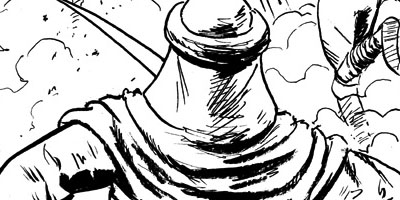
Click on thumb to see full
As always, you can also go to the dedicated Al’Rashad site.
9
Jun

As always, you can also go to the dedicated Al’Rashad site.
4
Jun
As part of Torontoist’s Crack (Adjective, Not Like, The Drug – Yes We Get That It’s A Reference) Political Team, we covered the provincial leaders’ debate. It was actively painful.
2
Jun
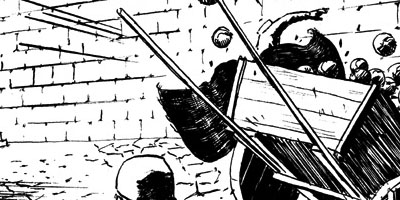
As always, you can also go to the dedicated Al’Rashad site.
2
Jun
My weekly TV column is up at Torontoist.
1
Jun
I found a copy of ‘Hitch-Hiker’s Guide to the Galaxy’ yesterday at a used book store for a dollar and change, which makes me tremendously happy because I can’t find the house copy and I have at least two people I’ve been meaning to lend it to. I’ve been meaning to lend it to them for a while now because they’ve never read it, and I think they should…which is where this gets complicated.
Because the last time I asked what media all geeky people should experience, it kind of got bogged down in questions about what the hypothetical lender was trying to instill into the lendee, and whether the idea was worthwhile to begin with given that every generation develops its own cultural touchstones and doesn’t necessarily need other people’s. Which is certainly true…goodness knows, I’ve never insisted that my daughter watch the things I loved when I was a kid solely so that she can understand my childhood experiences. (Which isn’t to say we’ve never watched Bugs Bunny cartoons together.) But I don’t think it’s as simple as saying, “You shouldn’t force your classics on other people,” because I’m a lit major, and science-fiction is a branch of literature.
And like all good literature, good science-fiction/fantasy inspires and influences its successors. Sometimes in obvious ways–there’s no question that ‘Star Wars’ inspired a generation of film-makers to use Lucas’ cinema verite style in their own sci-fi films–and sometimes in less obvious ways, like the New Wave science-fiction of the Sixties and Seventies that was a conscious reaction against the pulps. Experiencing these influential stories (let’s shy away from calling them “classics” for the moment, as that’s a loaded term) can help you get more out of the current output in the field by showing you more of what influenced and inspired the current writers, just like reading Norman Mailer will help you get more out of Chuck Palahniuk.
So with that squarely in mind as our goal, “What science-fiction/fantasy media is influential enough that you’d recommend it to someone as useful in helping them understand the roots of their current “genre” interests?”, then what would be on your list? Feel free to answer in the comments!
28
May
FAVORITE CHOCOLATE BARS OF SUPERHEROES
Superman: Whatchamacallit (he thinks it’s a funny name even now. Lois just grimaces)
Kitty Pryde: Reese’s Pieces
Aquaman: Bounty (he prefers it to Mounds)
Cyclops: Snickers
Martian Manhunter: everyone gets him Hershey’s Cookies N’ Cream but it’s not proper cookies and he doesn’t really like white chocolate anyway; he likes Terry’s Chocolate Orange
Wolverine: Coffee Crisp (because Wolverine is Canadian, see)
The Flash: Mars bars (fun fact: you can cram an entire Mars bar in your mouth incredibly fast)
Hawkeye: M&Ms
Green Lantern (Hal Jordan): “Chocolate bars? Oh, I dunno. I haven’t had a chocolate bar in a while, mostly because I spend all my time in space. Hey, you know who makes a great dessert? Thanagarians. They do this thing, it’s kind of like a chocolate bar but it’s way better. I can’t really describe it. It’s a shame you can’t go to space.”
Mr. Fantastic: Milk Duds
Spider-Man: Payday, because actual chocolate bars always smear on his mask and then he has to put the mask in his laundry and that’s such a pain but Payday is just firm caramel and peanuts so it doesn’t leave stains
Captain America: Hershey Bar
Beast: anything with toffee in it, but Bobby always buys him Chicken Dinners because Bobby thinks that is a funny joke and Hank just sighs1
The Thing: Valomilk
Wonder Woman: Green & Black’s
Green Arrow: Avoids most chocolate because of third-world labour issues but since he found out Cadbury has at least an okay labour force, if not exceptional, he will occasionally indulge in a Caramilk
Dr. Strange: York Peppermint Patties
Deadpool: Everlasting Gobstoppers
Batman: 88% dark Peruvian chocolate when he chooses for himself; Three Musketeers when Alfred brings him one for a snack
26
May
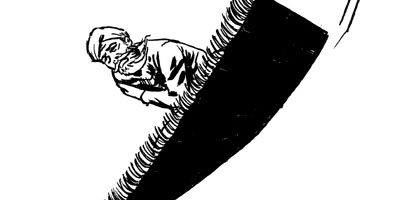
As always, you can also go to the dedicated Al’Rashad site.
26
May
My weekly TV column is up at Torontoist.
26
May
Three immediate caveats before I begin, here: First, yes, I am serious. Second, when I say “Knightfall” I’m actually referring to the entire “Knightfall/KnightQuest/KnightsEnd” saga that ran through the Bat-titles for the better part of a couple years, and when I say “The Death of Superman”, I’m really referring to the entire “Death of Superman/Funeral for a Friend/Reign of the Supermen” storyline that ran through all the Superman titles for a year or so. Third, yes, I’m still serious. I love these books.
I’m not blind to their faults, mind you. I agree that they have some flaws (the mindless Doomsday reading a “Metropolis” road sign, Shondra Kinsolving having magical healing powers that she can never use again after this one story, pretty much anything to do with the idea that Bibbo is effective comic relief), and they did usher in an era of gimmicky “replacement hero” stories that we’re still wading through today. But the reason they got imitated so often is the same reason DC is still doing riffs on ‘Crisis on Infinite Earths’: The original was so good, and so many people loved it, that everyone’s been trying to duplicate its success ever since. And these are good stories.
They both have something to say, and it’s pretty much the same thing (these stories are obvious bookends to each other, and everyone knew it even at the time): Why are Batman and Superman still relevant heroes for a modern era when they were created so long ago? Why are their morals and ethics still meaningful in an age where the anti-hero is celebrated and the “boy scout” mentality is seen as quaint? Why, in short, do we still need these two around?
Both stories go about answering these questions the same way: By giving us what we think we want. New villains are introduced to “permanently retire” the classic heroes (and although Bane and Doomsday were never again allowed to be as effective as they were in these stories, both worked well at the time–Bane was a cunning schemer as well as a physical threat, forcing Batman to run a gauntlet of all his worst enemies before taking him on, while Doomsday was a sheer elemental force of mindless rage) and once they’ve gone down, new versions are introduced that are more in keeping with the times. Azrael’s Batman is everything people wanted Batman to be–psychologically damaged in “cool” ways, brutal and uncompromising, and willing to kill…well, almost. One fair criticism of KnightQuest is that for a variety of reasons, they didn’t want to go too far with AzBat even though that’s what the story is arguably about. But even if he’s not quite where he needed to be, he’s certainly someone on the far side of the line that Batman refuses to cross.
And the Supermen, well…they went for a full-spectrum analysis of everything that makes Superman who he is. Each of the four Supermen represented an aspect of his character, and it says a lot that the two most positive (Steel and Superboy) went on to become mainstays of the DC Universe in their own right. The Eradicator plays the AzBat role in this scenario, doing all the killing and maiming that people seemed to want in their Superman. And the Cyborg? Well, everyone was a cyborg in the Nineties. Cable, Nathaniel Richards, the Winter Soldier…
And of course, without the originals, everything went to hell in a handbasket. AzBats lost his tenuous grip on sanity, the Cyborg blew up a city, the Eradicator started punishing people all out of proportion to their offenses…the message was clear, and well conveyed. The world needs a Batman and a Superman. It needs heroes, not just killers who prey on the people we’ve given up on. And when the heroes return, they set everything to rights. And more than that, they set their replacements on the right path. Obviously, the Cyborg was a straight-up villain and beyond redemption, but it says a lot that KnightsEnd concludes with Batman helping Azrael back to sanity instead of just beating him up, and that ‘Reign’ ends with the Eradicator learning enough empathy to sacrifice himself to restore Superman’s full strength. (Not that he stayed dead either, but…)
There’s a lot more I could say about these–I’ve completely glossed over ‘Funeral for a Friend’, for example, which really did explore the feelings of the supporting cast quite well and got into what it means to lose someone close–but ultimately, I think they’re really good explorations of their respective characters’ place in our culture while still being good adventure fiction. And you get to see Batman spray a panther in the face with a fire extinguisher, which is never a bad thing to have in your comics.
22
May
In email:
So say Marvel decides to do the unthinkable and make a movie with a female lead. How do they make it?
Pretty straightforward: you do Carol Danvers as Captain Marvel, and you do it as a passing-torch movie, with Mar-Vell falling from the sky and playing a combination of Abin Sur and Anthony Hopkins Old Zorro from Mask of Zorro. Say Mar-Vell has the Quantum Bands, which give him all the Captain Marvel powers – flight, toughness, blasting things, etc. (You probably also want to include a sensory power of some kind because it’ll create a visual hook and be the key to defeating whatever Big Bad eventually shows up – this could be her precognitive “seventh sense” or whatever, but the point is you need that power because without it her powerset is kind of generic. Although being able to fly in space unassisted is sort of a special thing in the Marvel movies right now, so maybe that instead? I dunno.)
Anyway. You can even work Mar-Vell having cancer into it – say the Quantum Bands are the only things keeping him alive and they won’t work much longer so he’s looking for a successor, and it can’t be a Kree because the Kree are planning to invade Earth, as alien empires do, and Mar-Vell is opposed to that so there you go, more comics adaptive referencing. Mar-Vell crash-lands on Earth, promptly gets picked up by the Air Force, and I think it would be pretty great if, rather than being “oh we must be suspicious and scared of the alien” they were immediately co-operative and worked with him. Except, of course, they want to make sure the Bands go to their handpicked alpha dog asshole, even though Carol is of course the superior pilot. Needless to say, Alpha Dog (hell, that should be his callsign) thinks the Bands are basically meant to be his, and everybody agrees with him. Except Mar-Vell, of course, and when a Kree advance strike force attacks that’s when he gives Carol the bands and then dies.
Anyway, the rest of the movie writes itself at that point: Carol has to deal with the military who, even if they can’t bring themselves to admit it, don’t want a woman having the awesome space weapons, and also with the Kree invasion force (probably involving a lot of deep-space fighting because that, in the movies, can be Captain Marvel’s Specific Thing). It’s definitely got a nice meta taste to it but I think that’s what makes it work.
20
May
Let’s start with the full disclosure: I know Lars Pearson, publisher of Mad Norwegian Press, well enough to be on a first-name basis with him at conventions. He has provided me with a few free books, some because I’ve helped him out with proofreading and some because he’s just a really nice guy. That said, I would still be telling you about how much I love the series of essay books he publishes even if none of that were true, because they’re really quite excellent on a number of levels. And apparently the Hugo voters agree with me, since one of them has already won a Hugo and there’s another nominated even as I write this (which is one reason I’m writing this now, because voting is still open for ‘Queers Dig Time Lords’ and it’s the best one yet. The other is I just saw him at a Doctor Who convention and I’m in the mood to talk about stuff that happened at the con.)
The essay series, which started with ‘Chicks Dig Time Lords’ and moved on to Whedon, comics, and has more in the works, is primarily intended as a space for people whose voice has traditionally been underrepresented in fandom to write about their experiences. The writing has been almost universally great, with some essays by excellent professional authors and new voices from within fandom, and it’s also been insightful. When you think you’ve seen it all, especially in a fandom like Doctor Who that’s now going into its fifty-first year and which had a period of about fifteen years with nothing to do but rewatch old episodes and talk about them to each other, there’s no substitute from getting a fresh perspective on the subject from someone whose life experience is different from your own. I’d never thought of relating the process of regeneration to transgender issues, but the metaphor was described so wonderfully in ‘Queers Dig Time Lords’ that I can’t see it any other way now. To me, it’s important to give these perspectives a voice, and I’m glad Mad Norwegian feels the same way, because opening oneself up to new perspectives helps you to appreciate other people as people. I always feel like I come away from these books with a tiny sliver of someone else’s viewpoint in my head, and it’s absolutely fascinating.
And they’re fun, too. Seanan McGuire (also known as Mira Grant, for those of you who’ve read her zombie novels) provides a hilarious piece in ‘Chicks Dig Time Lords’ describing her kid-self’s confusion about whether or not the Doctor was real–he was on PBS, after all, just like ‘Nova’ and ‘Wild America’. And Laura Mead gives an essay in ‘Chicks Unravel Time’ simply entitled “David Tennant’s Bum”. Because perspective is one thing, but nobody wants to be boring.
I’m really hoping that ‘Queers Dig Time Lords’ wins a Hugo, because I do think it’s better than ‘Chicks Dig Time Lords’; there are several essays that are genuinely moving, and I hope Hugo voters agree with me. But I also just think they’re worth reading, and I think that the people who read this site would like them.
20
May
(spoilers abound)
ONE I think a large part of the reason it is being so praised is that visually, the movie is absolutely stunning on any number of levels. This is not only with respect to shot framing – certainly Gareth Edwards’ shot choice in this movie is staggeringly good, and on a visual level this is easily the most cunningly-directed blockbuster since probably Peter Jackson’s Lord of the Rings movies (which it surpasses). But everything is masterful: the visual pacing and storytelling is on a whole other level, going beyond the reliable competence one hopes to get out of a blockbuster and heading into the realm of art.
TWO From a storytelling standpoint the choice to not really go full-bore with the Major Godzilla Fight Sequence until the very end of the movie is wise for multiple reasons. Firstly, there is the whole building-up-of-anticipation thing, which is always fun and it’s nice to see a movie that’s willing to deny the audience satisfaction until the movie’s actual climax for once. But secondly, here is the truth: after about ten minutes, giant monster fights are boring because there’s only so many things you can do with giant monster fights; one of the reasons Pacific Rim drags at times (and it does drag) is because there are too many giant monster fights in that movie.
THREE Similarly, the script also makes the gutsy choice of killing off Bryan Cranston’s character in the first third of the movie. Post-Breaking Bad this is particularly ballsy; I mean, between the Cranston-heavy trailer and nerds on the internet being all “it’s WALTER WHITE VERSUS GODZILLA” like that would be something anybody would want to see I was expecting plot awfulness. We did not get that, and this was good.
FOUR Of course, all of this is just asking if the movie is well-crafted, which was evident. But now we must ask the question of whether or not it was artistically coherent. Firstly, it is worth noting that my previous suspicions re: the movie’s shifting allegory are partially correct. Although nuclear energy is in part responsible for giant monsters (they feed on radioactivity? Okay whatever), the movie’s central thesis is indeed “man cannot hope to control nature.” Which: okay, fine, it’s not a terrible analogy to use for Godzilla movie purposes, there’s still some nice notes about the hubris of mankind in that, fine and dandy.
FIVE But the problem is that underlying the plot of “man cannot hope to control nature, so here are giant monsters fighting to the death” is a certain lack of anything making sense. Godzilla shows up to kill the other giant monsters why exactly? I mean, you can have Ken Watanabe mutter profound nothings about “restoring the balance” all you like but in the end, Godzilla becomes a giant deus ex machina whose presence is not really satisfactorily explained, and the absence of a coherent reason for Godzilla to exist in a movie where the craft is so evidently thought out in most other respects is… jarring, to say the least.
SIX And then you have the fact that the movie contradicts itself by the Sergeant Kick-Ass On The Ground plotline, because the movie literally says about a dozen times that Man Cannot Hope To Control Nature but then Sergeant Kick-Ass destroys all of the giant monster eggs and provides the crucial distraction needed to draw away one of the giant monsters so Godzilla can kill them one at a time, and this is frankly as annoying as all get out because either Man Cannot Hope To Control Nature or He Can and you kinda have to pick one of them ahead of time and make your movie on that basis, because Man Cannot Hope To Control Nature Except When Needed To For Plot Purposes is dumb.
SEVEN Still, complaints about coherency aside, it’s a fine movie, easily heads (and tails) above most summer blockbusters. And that counts.
19
May
My weekly TV column is up at Torontoist.
19
May
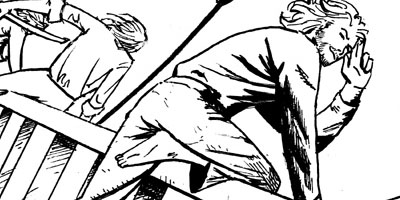
As always, you can also go to the dedicated Al’Rashad site.
13
May
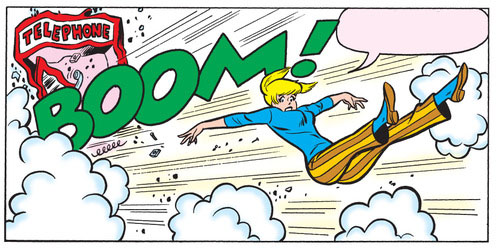
"[O]ne of the funniest bloggers on the planet... I only wish he updated more."
-- Popcrunch.com
"By MightyGodKing, we mean sexiest blog in western civilization."
-- Jenn
